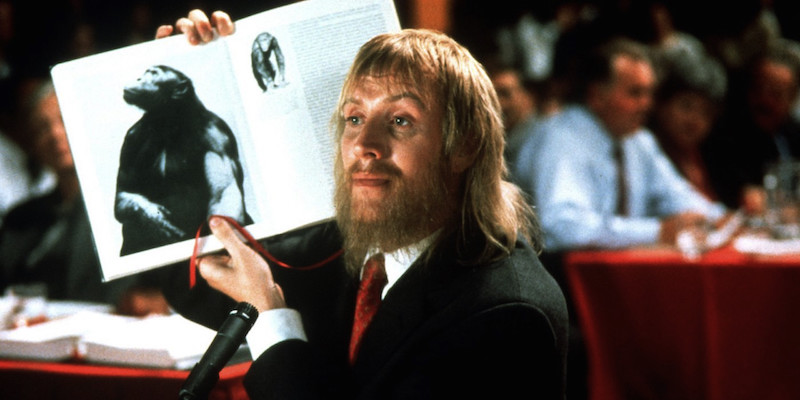From the Archive: The Charlie Kaufman Canon
As Anomalisa opens in Austin, we revisit interviews and reviews
By Kimberley Jones, 7:00AM, Fri. Jan. 15, 2016
Is Charlie Kaufman the most talented screenwriter of his generation, or any generation? That’s a question we pondered a few years back in a Chronicle Film Fight back-and-forth, and it’s struck us anew as a new Charlie Kaufman picture opens in Austin theatres today.
Of course, Kaufman is no longer solely a screenwriter; starting with 2008’s Synecdoche, New York, he’s assumed the mantle of director as well. No matter who’s directing – be it Kaufman or repeat collaborators Michel Gondry and Spike Jonze – a movie written by Charlie Kaufman tends to be a Charlie Kaufman picture, so complete and idiosyncratic is his scripted vision. Moving backwards through his dazzling filmography, we page through our backlog of interviews and reviews.
Anomalisa
Opening in Austin theatres today and co-directed with Duke Johnson, Anomalisa plumbs one man’s numbness to human connection, played out by puppets via breathtakingly crafted stop-motion animation.
“No description of Anomalisa will ever equal the experience of watching it. These stop-motion puppets are moving, even heartbreaking. Their loneliness can’t be punctured like flesh and blood. Kaufman, who co-directed with animation expert Duke Johnson, has found yet one more way of making consciousness felt.”
Read Marjorie Baumgarten’s review from Fantastic Fest 2015.
”[I]t includes the film’s much-heralded sex scene, a deeply realistic interplay that moves from the awkward, initial sorries inevitable to humans tentatively touching one another for the first time to a tender unspokenness as they open themselves up to the experience.”
Read Kimberley Jones’ 3.0 star review.
Synecdoche, New York (2008)
Voted the best film of 2008 by Austin Chronicle critics, Charlie Kaufman’s directorial debut, Synecdoche, New York, is a dizzying exploration of mortality and creative expression as told through the eyes of a theatre director (played by Phillip Seymour Hoffman), who is trying to produce a larger than life and grappling with death piece of ongoing performance art.
“Worry not, for the time being, about the definition, pronunciation, or meaning of ‘synecdoche.’ For the purposes of this review, this movie’s title translates as only one thing: masterpiece.”
Read Marjorie Baumgarten’s 4.5 star review.
“The morning I meet Charlie Kaufman, he is tired, run ragged from weeks of promoting his new film, Synecdoche, New York. He is already arguably the world's most celebrated contemporary screenwriter, but this film – a dizzying exploration of mortality, romance, regret, and the creative process – marks his first time in the director's chair. As the face of the film, he must shoulder the promotional process all on his own, this despite being famously press-shy. So Charlie Kaufman is tired. He is tired, he is cold, and he is feeling down.”
Read Kimberley Jones’ interview with Charlie Kaufman.
“On first watch, the density of the thing is overwhelming. Kaufman embeds wordplay throughout: The title – sounds like "Schenectady" – is a figure of speech in which a part is subbed for a whole, or the whole for a part (the play for a man's life? one man's inner search for the whole of human experience?); Caden Cotard's name hat tips the Cotard delusion, a mental disorder in which the sufferer is convinced he's already dead; and another surname, only glanced at, references something called the Capgras syndrome, in which a person is convinced his friends and family have been replaced by impostors. Kaufman plays fast and loose with timing, too: The opening sequence seems to chronicle a single morning, until you start to notice the subtle time stamps throughout and realize whole days and even months are whizzing by. (Life moves fast – and so very slowly.) And then there are the bewildering visuals: a tattoo of a flower that wilts real petals, a house forever engulfed in flames. All of the films in our Creatives in Crisis series have involved fantasy sequences, but SYNECDOCHE, NEW YORK is notable for how completely it collapses the distinction between real life and dream. Actually, "dream" is a misnomer. What Kaufman is getting at with this at-first-glance befuddling imagery is a concrete expression of intangible anxiety: The literal blood poisoning and figurative mental poisoning of a dying woman is manifest in the symbolic shedding of her toxic tattoo, while Hazel, Caden's inamorata and a prospective home owner (played by Samantha Morton), sensibly assesses a house on fire (she worries she'll die of smoke inhalation) and decides it's worth the risk. Or, more aptly, she embraces her fate in a way that the death-obsessed Caden cannot.”
Read Kimberley Jones’ program notes for the Austin Film Society series, After 8 1/2: The Creative in Crisis.
Eternal Sunshine of the Spotless Mind (2004)
Kaufman has always been interested in the life of the mind. Here, in his Oscar-winning lightly sci-fi romance, he sets the bulk of the film quite literally in the mind, as Jim Carrey’s Joel has his memories of ex-girlfriend Clementine (Kate Winslet) erased from his brain at Dr. Mierzwiak’s clinic, only to discover midway through the process he’d like to keep these memories, however painful they may be. Kaufman won the Oscar for Best Original Screenplay for the film, as well as the hearts of Chronicle critics, who named it their favorite movie of the year.
“Oftentimes, love can lead to regret. In the best-case scenario, we learn from the experience and move on. But what if it were possible to eliminate the regret – and not only that, but extinguish the memory altogether? That’s the wild premise on which Eternal Sunshine of the Spotless Mind is predicated.”
Read Marjorie Baumgarten’s 4.5 star review.
“‘I was interested in the idea that people go and make the same mistakes," Kaufman explains. "They do it because even though it's hellish, that's who they were meant to be with. But because of the erasing, they don't know that. They continue to make the same mistake over and over again.”
Read Kimberley Jones’ interview with Charlie Kaufman.
“There is quite simply no wrong note hit here. Every element – from the dazzling visuals by Michel Gondry (working with DP Ellen Kuras) and Valdis Oskarsdottir’s nimble edit to Jon Brion’s aching original score and the leads’ career-high performances – works in concert with Kaufman’s Oscar-winning script to produce a veritable symphony of longing and long-suffering and, finally, acceptance. Kaufman and company have admirably refused to ingratiate themselves with the audience; there was never going to be a happily-ever-after to this story. But I think that’s why it so deserves to be included in the comedy of remarriage canon. The end-solution of the comedies of remarriage was never about the reunited couple getting a “do over.” Instead, they were about reconciliation with all the facts on the table. Not a do-over, but a start-again, with clear eyes.”
Confessions of a Dangerous Mind (2003)
Kaufman made fanciful work of Chuck Barris’ dead-serious claim that he was a CIA operative in between hosting 70s mainstay The Gong Show.”The film's title is nicked from Barris' ‘unauthorized autobiography,’ which not only dished the dirt on his various backstage proclivities and the creepy hedonism of the Seventies, but also delved into his longstanding assertion that he was – at the same time – working as a double agent for the CIA. Though those claims have been laughed off by many in the industry who know him best (Barris himself refuses to comment one way or the other these days), George Clooney and Charlie Kaufman use those far-fetched unlikelihoods as the template for a great, bizarre, and ultimately very, very unique film. There's nothing like Confessions of a Dangerous Mind out there right now (and likely there never has been), and while at times it seems to border on straight bio-pic territory (with the usual Kaufman twists, natch), it's still a gleefully crazed debut from Clooney, with a solidly weird turn from Sam Rockwell as Barris.”
Read Marc Savlov’s 3.0 star review.
Adaptation. (2002)
Struggling with how to adapt Susan Orlean’s nonfiction book about the hunt for the elusive ghost orchid, Kaufman wrote himself into the story – twice, in fact, with twin frères, cheerful Donald and existentially glum Charlie, both played by Nicolas Cage – and invented a most exquisite deux ex machina in the shape of a ravenous gator. Nothing in Robert McKee’s rulebook could prepare viewers for the delicious mayhem of Adaptation., which earned Kaufman his second Oscar nomination.
“[D]irector Spike Jonze and writer Charlie Kaufman (the same team that gave us Being John Malkovich) poke through so many portals of inquiry that it's alone a sheer triumph that their film doesn't wind up lost down some porous black hole of the imagination. Instead, the movie incites cascades of synaptic firings that lead viewers toward new understandings, insights, and musings that are likely to reverberate long after the movie ends. All this from orchids?”
Read Marjorie Baumgarten’s 4.0 star review.
“Kaufman didn't warn the studio execs of his change in focus – an exceedingly benign method of describing the film's surreal acrobatics – before he handed in the script. ‘I thought it was going to be the end of my career. And I'm not kidding. I was panicked about it.’”
Read Kimberley Jones’ interview with Charlie Kaufman.
Human Nature (2001)
Future Eternal Sunshine director Michel Gondry first teamed up with Kaufman with this enjoyably weird, research-clinic-set comedy about nonconformity and body hair. Not well received at the time, it still made for an apt metaphor for Kaufman’s swelling fanbase – happy lab rats, we, our paws poised at the pleasure button, forever wanting more Kaufman, please.
“The old nature-vs.-nurture argument takes a beating in this smart absurdist comedy written by Being John Malkovich’s Charlie Kaufman and produced by that film's director, Spike Jonze. This feature debut by French video director Gondry is a goofy and winning thing of sheer lunatic beauty, and although it never quite jells as well as Malkovich, it's still the brainiest, funniest thing out there.”
Read Marc Savlov’s 3.5 star review.
Being John Malkovich (1999)
Kaufman’s first feature film set the trend for Chronicle critics – it was the first time he topped our Top 10 list. (Notably, it bested Rushmore, Three Kings, American Beauty, and Election – what a year for movies, eh?) A startling outlier in indie film when it debuted, Being John Malkovich – about a depressed puppeteer (John Cusack) who by accident discovers a portal into John Malkovich’s brain – set the mold for the words that would follow Kaufman throughout his career: Dazzling. Oddball. Distinctive. Wildly inventive. Brilliant.
“Rarely is there a movie about which you can honestly say that it's like nothing you've ever seen before. Being John Malkovich is one such movie – a wildly inventive, unrelenting thrill that amazes us with its visual and intellectual treats and dazzles us with its ongoing ingenuity. That this is the first feature film by Spike Jonze only adds to its luster, although anyone familiar with Jonze's imaginative commercial work for such advertisers as Nike and Nissan will not be altogether surprised. Screenwriter Charlie Kaufman, however, is also a first-timer, and though it might be natural to wonder from what inner sanctums this writer channeled his story's ideas, it's probably best to just sit back and enjoy the result.”
A note to readers: Bold and uncensored, The Austin Chronicle has been Austin’s independent news source for over 40 years, expressing the community’s political and environmental concerns and supporting its active cultural scene. Now more than ever, we need your support to continue supplying Austin with independent, free press. If real news is important to you, please consider making a donation of $5, $10 or whatever you can afford, to help keep our journalism on stands.
Kimberley Jones, Nov. 14, 2008
June 6, 2025
June 6, 2025
Charlie Kaufman, Anomalisa, Synecdoche, New York, Eternal Sunshine of the Spotless Mind, Human Nature, Being John Malkovich, Adaptation., Michel Gondry, Spike Jonze
















